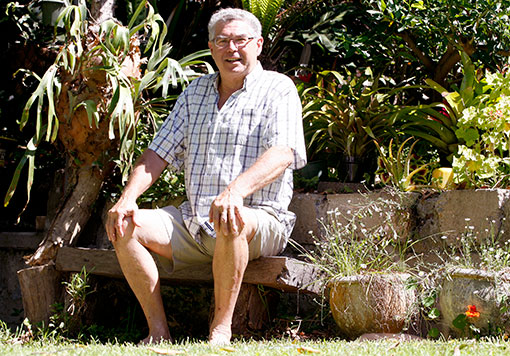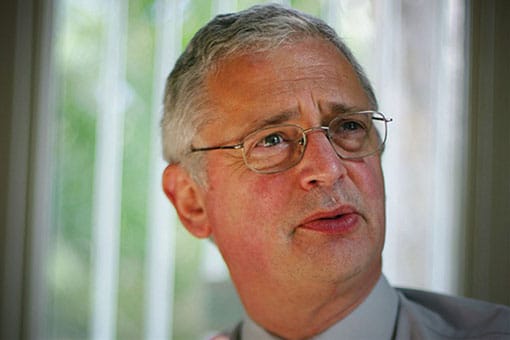
Retired building surveyor Colin Sandeman is living proof that a ground-breaking prostate cancer treatment, which temporarily gives men menopause-like side effects, is right on target.

Like most blokes, Colin Sandeman loved the occasional cold ale while sailing, canoeing and camping in the great outdoors. But there was a simple, sensible rule – every beer had to be accompanied by a glass of water.
Colin began noticing that he frequently had to go to the toilet whereas his mates could sink three or four cans and waters between wees. It was the same at night, when he had the urge to urinate four or five times.
He eventually visited an urologist, only to be told he had advanced prostate cancer. It was the last thing Colin expected.
“My doctor was an old-school type who didn’t really believe in the PSA test,” Colin said. “I ended up having a TURPs [Transurethral Resection of the Prostate] rebore and that’s when they found the high levels of cancer.”
Colin was 61 years old at the time. His PSA (prostate-specific antigen) level was 28 and his Gleason score, which pathologists use to determine the aggressiveness of prostate cancer, was nine out of 10.
“The urologist said ‘I’ve got a bloke doing a lot of good work in prostate cancer’ and referred me to Jim Denham.”
As a radiation oncologist at the Calvary Mater Newcastle and Director of the Prostate Cancer Trials Group, which works in collaboration with HMRI’s Cancer Research Program, Professor Denham was recruiting for a trial known as RADAR (Randomised Androgen Deprivation and Radiotherapy).
Essentially that meant using hormone therapy in conjunction with radiation treatment, the layman’s logic being that lowering the testosterone level would shrink the prostate gland …and, accordingly, the cancer.
The study was also testing whether the drug Zometa could prevent losses in bone mineral density and stop the spread of secondary cancers into the bones.
RADAR was kick-started by a donation from HMRI supporters Gallerie Fine Jewellery as the successor of the Trans-Tasman Radiation Oncology Group 96.01 trial which showed a 50 per cent reduction in the death rate for men with locally advanced prostate cancer when six months’ hormone therapy was used in conjunction with radiotherapy.
With RADAR, Professor Denham was aiming to see whether 18 months of hormone therapy was superior to the standard six months.
Under the randomised selection system, Colin Sandeman received the trinity of treatments, including 36 days of radiation, 18 months of hormone injections and Zometa administered by IV every three months.
“I was lucky in a way,” Colin said. “The whole process was highly organised and very easy … there’s a car park for you, you get treated, then drive home. I could’ve been working through it all, no dramas.”
Colin, in fact, had been retired for three years when he received the diagnosis. A carpenter by trade, he had worked at Newcastle City Council as a building surveyor for 30 years.
While he enjoyed an active life and a reasonable diet, cancer crept up on him. In hindsight, though, there was a family history of the disease: “Dad had prostate cancer 25 years ago and had to travel to Sydney to have radiation treatment. My older brother has had radiation since me, and my uncle also suffered from it,” Colin said.
“I wasn’t as deflated by the diagnosis as others possibly were. As part of the RADAR program they sent out a questionnaire that was titled ‘Survivors Survey’ but I didn’t think of myself as a survivor – I never thought I was going to die from it.
“The survey mentioned depression and other problems. I was never too anxious, I just accepted it and prepared myself to get healed.”
While cancer-related outcomes of the trial won’t be known until next year, Professor Denham said that androgen deprivation had previously been shown to destroy millions of cancer cells that otherwise would thrive on testosterone.
The greatest cause of death in prostate patients is the cancer metastasising into the bone, which is why his work aims to improve the survival rate of those most at risk.
“We found that patients with cancers that have a good hold in the prostate, 30 per cent of those men have metastases growing even if their scans show they don’t,” Professor Denham said.
“Around 6000 to 7000 of the 18,000 men diagnosed with prostate cancer each year have locally advanced cancers like Colin. Most of the 3000 prostate cancer deaths each year are directly linked to cancers diagnosed at this stage, so if you can prevent or beat these cancers by earlier diagnosis or eliminate them with better treatment, you can make a big impact on survival rates.”

The downside of the hormone therapy is that men experience temporary symptoms similar to menopause, so the toxicity and quality-of-life effects were also studied in the cohort of 1000 men recruited across 23 cancer centres in Australia and New Zealand.
The initial clinical findings were published recently in the prestigious international journal The Lancet Oncology.
“I am highly encouraged by the quality-of-life findings, which are considerably better than anticipated,” Professor Denham explained. “We obviously want better treatment outcomes but not at the price of severe side effects.
“In around one quarter of men this can include hot sweats, a reduction in libido and erectile dysfunction. Other repercussions include swelling of breasts, depression, loss of cognitive function, weakening of muscles, anaemia and bone fractures due to loss of mineral density.
“This can be quite devastating for a man but we found that the additional 12 months of hormone therapy had little long-term impact compared to the standard treatment. The majority of men returned to normal once the therapy ceased.”
Colin Sandeman experienced minimal impact throughout his treatment cycle.
“Half way through radiation I became tired, which they predicted” Colin said. “I’d also break out in sweats. I remember going to Sydney on a train in the winter, with a jumper on. I’d pull it off, then put it back on, then pull it off again, and my friends would ask ‘what’s up with you?’.
“I also had no sexual urges for two years, just wasn’t interested at all.”
After the treatment, Colin’s PSA reading was a fraction over zero. Today, at the age of 68, it remains below 1. His libido is restored and the hot flushes have ceased.
He’s back into sailing and canoeing on the Myall Lakes and tending his “pets” – bees that nest in nine hives around his Kotara home. He has blood tests every six months and takes a jar of honey on his annual visit to Jim Denham.
“They’ll keep observing me for 10 years but I don’t think about having prostate cancer now. It’s in the past. I’m normal, and so many other blokes are too – they’re curing a lot of people,” Colin said.
It wasn’t until the fourth year that Professor Denham finally let Colin thank him for saving his life. “For the first two or three years Jim would say ‘don’t thank me yet’. After four years I said ‘can I thank you now’ and he said ‘yes, you can now’.”
HMRI would like to acknowledge the Traditional Custodians of the land on which we work and live, the Awabakal and Worimi peoples, and pay our respects to Elders past and present. We recognise and respect their cultural heritage and beliefs and their continued connection to their land.
Hunter Medical Research Institute
We’re taking healthy further.
Locked Bag 1000
New Lambton
NSW, Australia, 2305


This site is protected by reCAPTCHA and the Google Privacy Policy and Terms of Service apply.
Copyright © 2024 Hunter Medical Research Institute | ABN: 27 081 436 919
Site by Marlin Communications
